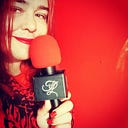Beverly Hills Celebrity Doc: “If You’re Trying To Lose Weight By Dieting- You’re Doing It Wrong!”
Dr. Nina Savelle-Rocklin, a celebrity psychoanalyst and author of the important new book “THE BINGE CURE : 7 Steps To Outsmart Emotional Eating” is also the Host of The Dr Nina Show on LA Talk Radio. She has also appeared in media across America (Dr Drew, Psychology Today, The Los Angeles Times, Prevention, Real Simple, Redbook, Huffington Post, Beverly Hills Times, among others) and is the co-founder of The Binge Free Babes project launched during covid with Kelley Gunter author of You Have Such A Pretty Face.)
Whenever she has a chance to speak to an audience — she tells them the same thing she tells her celebrity clients : “If you are trying to lose weight by dieting, you’re doing it wrong.”
In fact THIS diet doctor is more likely to tell you to cut out the negative thoughts in your head than to cut out your favourite desert.
And that’s just what she and Kelley told the members of the groundbreaking new support group that meets online every Monday night — the Binge Free Babes — to do in a recent assignment.
Telling the group to commit themselves to stopping their regular “verbal assaults" on their own self esteem, she directed them to a section of her book and advised them to “ Go on A Word Diet” cutting out words like fat, or can’t, or stupid out of their mental mindscape.
Recently asked to comment on her work and some of the issues she deals with, she had this to say :
“I’m a psychoanalyst specializing in eating disorders, primarily binge eating disorder. For the past 18 years, I’ve exclusively treated women (and men) who struggle with food, weight, and body image issues. My book first book, Food For Thought: Perspectives on eating disorders, has been widely recognized as a comprehensive overview of the psychoanalytic treatment of eating disorders. My newest book, for mainstream readers, is The Binge Cure: 7 Steps to Outsmart Emotional eating and I’m co-editor (with Salman Akhtar) of Beyond The Primal Addiction in which I discuss food addiction. My chapter on psychoanalysis in Freud & The Buddha was used to teach Harvard Medical students about psychoanalysis. I’ve written countless articles on the topic of disordered eating, weight shaming, body image issues, and the psychology of eating problems.”
She says parents pass on negativity surrounding food and body issues on to their children “both covertly and overtly.”
“Children take cues from their parents on how to think about themselves and others,” she explained to a reporter writing a story on body image recently.
“ A parent who complains about her weight and decries the size of her thighs is sending a covert message to her child that bigger thighs are unacceptable. That child is more likely to have body image issues than a child whose mom who appreciates her own curves (or better yet, doesn’t say anything about her body or anyone else’s).”
Savelle-Rocklin says “Fatphobia begins early. Many of my patients report being bullied or shamed as children because of their size. Both the societal/cultural experience of being targeted, shamed, and stereotyped because of weight and also internalizing those shaming messages, damages self-esteem, and may cause depression, anxiety, social withdrawal. This way of being in the world lasts beyond childhood into adulthood.”
When asked how people can start to change their ingrained unhealthy attitudes, she has some actionable tips :
“Challenge the idea that you’re somehow better, more likable, or more acceptable if you’re a certain size. Would you like your friends better if they dropped a few pounds? Probably not! So, why do you imagine you’re not good enough exactly as you are?”
Dr Nina’s parting words of advice for readers?
“Ditch dieting. Weight-loss diets are about deprivation on some level and both the anticipation of deprivation and the experience of deprivation makes you want something more. If you tell yourself you’re not allowed to eat cookies, then you’re going to want cookies more than anything. Diets also put the focus on what you’re eating, instead of why. There are many reasons you might be eating, other than hunger, such as comfort, distraction, or reward.”
Food for thought.
Get on Amazon: The Binge Cure: 7 Steps to Outsmart Emotional Eating
Website: DrNinaInc.com
Listen to The Dr. Nina Show on LA Talk Radio
